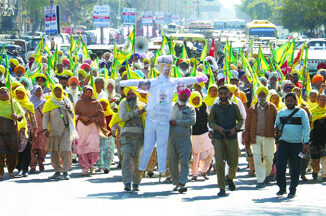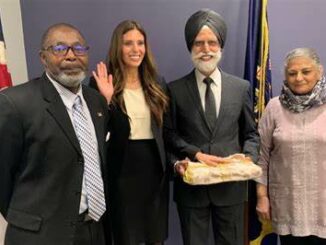
ARKANSAS (TIP): Indian American information scientist Dr. Nitin Agarwal working at the University of Arkansas at Little Rock is part of a Department of Defense funded international research project to investigate covert online influence. Agarwal, Jerry L. Maulden-Entergy endowed chair and distinguished professor of information science and director of the Collaboratorium for Social Media and Online Behavioral Studies (COSMOS), will serve as principal investigator for UA Little Rock, according to a university press release.
UA Little Rock is part of an international research cohort that has received about $2.35 million in funding from the DoD to investigate the use of social cyber forensics to understand covert online influence. It will receive $691,339 for its part of the project, which began in February and will conclude in 2025.
The four-year project, “Fusing Narrative and Social Cyber Forensics to Understand Covert Influence,” is headed by Dr. Scott Ruston, a research professor with Arizona State University’s Global Security Initiative.
Additional research partners include Nanyang Technological University in Singapore and experts from Indonesia and the Philippines.
Countries can use the ease of information access via new media technologies to create manipulation through disinformation and propaganda, which can cause adverse effects on sovereignty and political stability, the release said.
This research will help fill the knowledge gap the US faces with regard to China’s engagement in “informationized” warfare and will more broadly establish a model for effective analysis of strategic influence in the Middle East, Europe, and other regions.
“Increasing proliferation of social media provides tremendous opportunities for gaining situational awareness to assist with strategic policy making, particularly in defense, security, diplomacy, and foreign policy,” said Dr. Agarwal.
“However, social media data is often riddled with challenges such as high volume and velocity, noisy data, missing data, and incomplete data,” he said.
“This project will develop computational, systematic, and rigorous methods that are grounded in social science theories and cyber forensic methodologies to study big social media data and surmount the challenges,” Agarwal said.
“We live in a dynamic world, and many of the challenges we face are social or have social elements,” said Dr. Bindu Nair, director of the Basic Research Office in the Office of the Under Secretary of Defense for Research and Engineering.
“The knowledge and methodologies generated by (DoD’s) Minerva teams are fundamental to understanding how social forces shape regions of the world of strategic importance to the United States.”
The researchers will study online influence targeting Indonesia and the Philippines that uses narratives to manipulate public opinion and create political action favoring China.
Subject matter experts in Indonesia and the Philippines will identify issues prone to influence in each country, as well as insight into online venues of influence, propaganda, and disinformation.
They will also analyze how narratives circulating in the information environment align with Chinese strategy and national interests.
Dr. Agarwal and his team at COSMOS will conduct social network and cyber forensic analysis to examine online activity and the dissemination of ideas and elements of these narratives. They will also observe virtual proxies of political action.
“The grant will allow us to develop research-based models and operationalize them in our social media monitoring tools, Blog Tracker and Video Tracker, to assist the United States defense in countering cyber-threats in an emerging socio-technical context, particularly in the Indo-Pacific region,” Dr. Agarwal said.
The grant is managed by the Office of Naval Research and awarded under the DoD’s Minerva Research Initiative which supports basic research focusing on topics of particular relevance to US national security.
Through its network of faculty investigators, Minerva also strengthens the department’s connections with the social science community and helps DoD better understand and prepare for future challenges, including National Defense Strategy priorities such as great power competition, the release said.





Be the first to comment